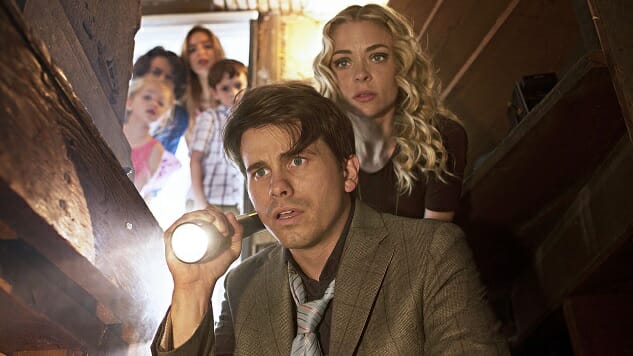Bitch

Marianna Palka’s new film, the bluntly titled Bitch, opens on a long take of a sun-kissed, tree-lined suburb overwhelmed by a cacophony of dogs barking. As the canine chorus reaches its peak, we cut to Palka, playing dissatisfied housewife Jill Hart, a woman so far past the end of her rope that she has none left to hang herself with. She has to make do with a belt. The results don’t pan out as she wants. After dangling from the dining room light fixture, she crashes to the floor in a heap when the structure proves too weak to hold her, and we cut again, this time to a portent: A dog running liberated through the streets of her idyllic neighborhood.
Bitch is Palka’s fourth feature as director and her second major outing in 2017, the other being the Netflix series GLOW. Fundamental differences aside, there’s a kinship at play here: Both productions sympathize with the frustrations felt by their female characters, each of them stuck in holding patterns established by male sovereignty. In Bitch, Palka gets to address those frustrations as both its author and its central figure. Jill is a woman after Pedro Almodóvar’s heart, her breakdown occurring fifteen minutes into the movie when her life at home becomes to too much for her to carry alone. She has four children—Tiffany (Brighton Sharbino), Max (Rio Mangini), Cindy (Kingston Foster), and Jed (Jason Maybaum)—with her husband, Bill (Jason Ritter), the latter of whom lives for his work to such extent that they’re all strangers to him. (He’s also an inveterate adulterer. We first meet him with his face buried in his secretary’s nethers before they’re interrupted by a phone call.)
Bill is actually the film’s protagonist, but only by default. After years of neglect and ingratitude, Jill snaps and takes on the persona of a particularly unruly dog. She clambers around naked on all fours, snarling and biting at anyone who gets too close to her, growing filthier by the second as hygiene becomes a bygone habit. The film documents Bill’s pathetic attempts at relearning his fatherly duties while facing up to his failures as a husband, and thus fixates on his journey with Jill serving as plot-driving window dressing. If Bitch was the product of male creativity, it’d be problematic, but Palka wrote and directed the picture herself, and that puts its power and gender dynamics in an entirely different light.
To a point, Bitch is a one-joke effort built around repeat humiliation of its leading man. Bill is disagreeable, whiny, ineffectual, self-indulgent, a total faker: He issues goodbyes to his children the morning of Jill’s devolution and tells her he loves her, as if he’s at all invested in the words. Maybe he is. Maybe he does love his family, but if he does he’s unequipped to actually show them, and less equipped still to perform the rudimentary tasks of adulthood and parenthood. His first day dropping his sons and daughters off at school is a sad joke, and he’s forced to call his sister-in-law, Beth (Jamie King), for backup. The dude is out of his depth, and the one person he selfishly relied on to keep him afloat is sunk herself. (The title feels like an etymological punchline, but it might just be referring to Bill.)
-

-

-

-

-

-

-

-

-

-

-

-

-

-

-

-

-

-

-

-

-

-

-

-

-

-

-

-

-

-

-

-

-

-

-

-

-

-

-

-








































